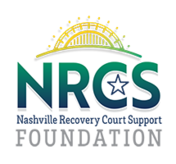Statements
Mission
In 1996, the Nashville Recovery Court Support Foundation (NRCSF) was incorporated to help the substance abuse problem in our criminal justice system. Vision: Individuals impacted by substance abuse and/or mental illness will live as self-reliant character driven citizens. Mission: The NRCSF is a model long-term recovery program that serves as an alternative to incarceration for persons with substance abuse and/or mental illness. NRCSF is an integrated court program that offers comprehensive recovery programming services to eligible non-violent felony offenders and carries out community activities that include advocacy, outreach, education and program reviews.
Background
There are six Criminal Courts in Nashville, Davidson County, Tennessee. Each of these Courts handles approximately 2000 cases per year. Approximately 80% of these cases will involve either drugs or alcohol. In addition, research indicates that at least 60% of the people charged in those cases have a chemical dependency problem. Before 1995, the Corrections Corporation of America (CCA) facility in Nashville was the only penal institution in the State of Tennessee that offered any type of long-term treatment for addiction. It was apparent to the Judges of the Criminal Courts that the recidivism rate for persons appearing before them with a chemical dependency problem was extremely high. In 1995, the Judges became aware of a program called "drug court" that was attempting to combat the lack of treatment for chemically dependent offenders. The program was offered in the form of Federal grants through the United States Department of Justice. Judge Seth Norman, Judge of the Division IV Criminal Court, and Donna Blackbourne, the Davidson County Criminal Court Coordinator, began work on an application for a study grant to determine the value of such a program for Davidson County. The application was submitted, and a study grant was approved by the Department of Justice. What started as an outpatient drug treatment program has now evolved into a multi-faceted program including residential, IOP, after-care services and an outpatient program. The inpatient program can house 40 female and 60 male long-term residents for treatment of chemical dependency.
Impact
Since the program was established and began taking it's first program intakes in 1996, over 970 offenders have successfully completed the program DC4 Program. Since 2013, over 195 offenders have successfully completed the Morgan County Residential Recovery Court Program. The recidivism rate for persons successfully completing DC4 Program is approximately 30% and the program's retention rate is about 59%. The recidivism rate for the Morgan County Residential Recovery Court is approximately 17% and the retention rate is about 68%. On average, participants from both programs had more than 8 previous drug charges, and had been previously incarcerated from three to five years. By using this approach since June of 1996, the Davidson County Drug Court program has accomplished the following: diverted approximately 2,190 people from the current criminal justice process, provided the community with thousands of community service hours annually, maintained a 100% employment rate for graduates, and 17 drug-free babies have been born (after graduating). All of this has been accomplished at an average cost of about $50.00 per day per resident as opposed to about $76 per day to house an inmate in the Tennessee prison system, representing a significant cost savings for tax-payers. This savings is solely in 'incarceration costs. A more accurate 'return on investment' includes benefits associated with the successful transitioning of more self-reliant, sober, and productive citizens who can positively contribute to society instead of being burdensome depends of the state. From an economic standpoint, this is a 'solution' to helping reduce costs associated with crime and addictive disorders.
Needs
We are working to diversify our funding sources. Individual support is strongly encouraged. We always welcome in kind donations-specifically gardening materials, paints & painting materials & equipment, gifts cards from Lowe's, Home Depot, & building materials for vocational development for our participants. We are also looking for committed volunteers and/or interns to support remedial education needs such as basic reading & writing tutoring. We are accepting interns from area colleges and universities in the social science and research fields and, to help us in developing a multi-year strategic plan, we are also interested in assistance from area business schools.
CEO Statement
It is an honor to serve as the CEO of the Nashville Recovery Court Support Foundation. Since 2004, we have expanded our impact to include initiating and sustaining critical DC4 program enhancements, the development, implementation and ongoing operation of the Morgan County Residential Recovery Court and the development, implementation and ongoing operation of the Women's Residential Recovery Court of Tennessee (WRRC). Our work is focused on ensuring this unique long-term residential recovery court model perpetuates into the future.
Service Categories |
|
| Primary Category: | Crime & Legal - Related - Prison Alternatives |
| Secondary Category: | Public & Societal Benefit - |
| Tertiary Category: | - |
Areas Served
Although originally focused on the Davidson County, the work of the NRCSF has expanded statewide and impacts all Tennessee counties and congressional districts. The DC4 Program serves non-violent offenders from 46 counties across the state with approximately half coming from Davidson County. The Morgan County Residential Recovery Court serves over 53 counties and 19 judicial districts across the state including Davidson County. Both programs have state-wide impact.
| TN - Cumberland |
| TN - Coffee |
| TN - DeKalb |
| TN - Dickson |
| TN - Fentress |
| TN - Davidson |
| TN - Franklin |
| TN - Hickman |
| TN - Humphreys |
| TN - Lewis |
| TN - Overton |
| TN - Perry |
| TN - Pickett |
| TN - Putnam |
| TN - Rutherford |
| TN - Coffee |
| TN - Smith |
| TN - Sumner |
| TN - White |
| TN - Wilson |
| TN - Williamson |

